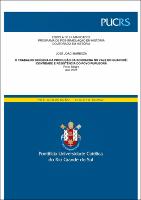| Share record |


|
Please use this identifier to cite or link to this item:
https://tede2.pucrs.br/tede2/handle/tede/11534| Document type: | Tese |
| Title: | O trabalho indígena na produção da borracha no vale do Guaporé : identidade e resistência do povo Puruborá |
| Author: | Barboza, José Joaci  |
| Advisor: | Hüttner, Edison |
| Abstract (native): | A presente tese tem por objetivo analisar através da História Oral, e da História indígena a trajetória do povo Puruborá, um povo que foi contatado por Rondon, no estado de Rondônia em 1909, e de imediato foi inserido no contexto do primeiro boom da borracha na Amazonia. Como consequência do contato, como ocorreu com todos os povos indígenas no Brasil, esse grupo étnico irá sofrer com a guerra bacteriológica que os não índios traziam consigo e, para os quais seus organismos não tinham proteção. Os poucos sobreviventes passaram a atuar na extração do látex, foram impedidos de se casarem entre si, de manterem comunicação na língua o Tupi Puruborá, isso implicou num processo de miscigenação entre indígenas, colonizadores e quilombolas. Os Puruborá passaram ainda por vários processos diaspóricos, o primeiro quando do fim do primeiro boom da borracha, o segundo quando da demarcação da Reserva Biológica do Guaporé e a terceira quando da demarcação da Terra Indígena Uru-Eu-Wau-Wau, ambas na década de 1980. Foram declarados pela FUNAI como povos extintos, no entanto no início do século XX retornam e se aglutinam em torno da Aldeia Aperoi e, retomam sua luta pela (re)demarcação do território, por educação intercultural e pela saúde indígena. Portanto, se trata de uma tese que vai falar de sua resistência e resiliência |
| Abstract (english): | The present thesis aims to analyze, through the Oral and Indigenous History, the trajectory of the Puruborá people a people who were contacted by Rondon, at the state of Rondônia in 1909, and being immediately inserted into the context of the first rubber boom at the Amazon. As a consequence of the contact that occurred with all indigenous peoples in Brazil, this ethnic group will undergo the bacteriological warfare brought by non-Indians and for which their organisms had no protection. The few survivors began to work in the latex’s extration being prevented of the marriage among themselves, and maintaining communication in the Tupi Puruborá language, which implied a miscegenation process between indigenous people, colonizers and quilombolas. The Puruborá also went by several diasporic processes, the first at the end of the first rubber boom, the second at the demarcation of the Guaporé Biological Reserve and the third at the demarcation of the Uru-Eu-Wau-Wau Indigenous Land, both in the 1980s. They were professed extinct by FUNAI, however at the beginning of the 20th century they returned and coalesce around the Aperoi Village, resuming their fight for the (re)demarcation of the territory, for intercultural education and for indigenous health. Therefore, this is a thesis that will speak of their resistance and resilience. |
| Keywords: | Povos Indígenas Puruborá História Indígena História Regional Rondônia Indigenous Peoples Puruborá Indigenous History Regional History Rondônia |
| CNPQ Knowledge Areas: | CIENCIAS HUMANAS::HISTORIA |
| Language: | por |
| Country: | Brasil |
| Publisher: | Pontifícia Universidade Católica do Rio Grande do Sul |
| Institution Acronym: | PUCRS |
| Department: | Escola de Humanidades |
| Program: | Programa de Pós-Graduação em História |
| Access type: | Acesso Aberto |
| Fulltext access restriction: | Trabalho não apresenta restrição para publicação |
| URI: | https://tede2.pucrs.br/tede2/handle/tede/11534 |
| Issue Date: | 31-Jan-2025 |
| Appears in Collections: | Programa de Pós-Graduação em História |
Files in This Item:
| File | Description | Size | Format | |
|---|---|---|---|---|
| JOSE_ JOACI_ BARBOZA_TES.pdf | JOSÉ_ JOACI_BARBOZA_TES | 9.83 MB | Adobe PDF |  Download/Open Preview |
Items in DSpace are protected by copyright, with all rights reserved, unless otherwise indicated.




